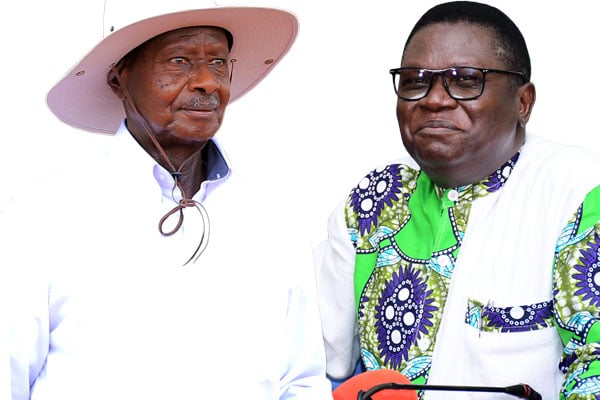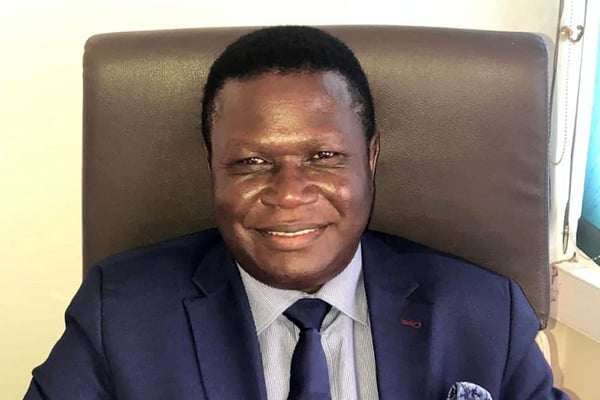Prime
Will latest DP-NRM deal face same fate as broad-based government?

Photo combo: President Museveni and Democratic Party president general Nobert Mao.
What you need to know:
- President Museveni recently came out to end the notion marketed by Democratic Party president general Nobert Mao that they had agreed that he handles a transition that would culminate in the end of Museveni’s decades-long hold onto power. Derrick Kiyonga looks back at the times President Museveni backtracked on something he is said to have agreed on.
Eyebrows were raised in August when Democratic Party (DP) president general Nobert Mao signed a deal with the National Resistance Movement (NRM) supremo, President Museveni, forming an alliance which came with quick dividends.
Mao was instantly appointed as minister of Justice and Constitutional Affairs and his secretary general Gerald Siranda was later sent to the East African Legislative Assembly with NRM’s backing.
What was in doubt wasn’t Mao and his group getting positions, but rather Mao’s claim that the deal he had struck with Museveni allowed him to form a constitutional review commission that would lead to transition.
“When you look at the Uganda Law Society, the current president is here and several past presidents are also seated. We the politicians have failed to change power peacefully. And you ask yourself in the words of Paul in the Galatians who bewitched us?” Mao said at a media briefing organised at the Ministry of Justice and Constitutional Affairs on July 29.
He went on to cite many countries within the region such as the Democratic Republic Congo (DRC), Burundi, Kenya and Tanzania that have changed leaders.
“Taking over this office is based on two things: the aims of DP, the party that I lead, and secondly, the agreement we signed with NRM,” Mao said.
He added: “We are going to look into rehabilitating the Constitution and also soliciting for views agreeable to Ugandans. We also want to look into the reconciliation process where we should repent and forgive each other as Ugandans.”
While Mao was talking about revisiting the Constitution, others were wondering which Constitution Mao was going to review.
Mr Peter Walubiri, a constitutional law expert, says there is no operational Constitution in Uganda, adding, “Even the little that survives is not allowed to work.”
“The Judiciary is supposed to be independent; it’s not independent. There’s a very clear bill of rights—basic things such as producing suspects in court within 48 hours don’t work. So, the whole political process of consensus broke down. There’s nothing to review,” Mr Walubiri adds.
But Mao insisted that his was a mission to see that there is a transition that would ensure that there will be a peaceful transfer of power.
“What then is the benefit to NRM by Mao’s ‘crossing’?” asks Mwambutsya Ndebesa, a political-historian at Makerere University. “Mao’s crossing to some extent will lead to despondency, despair and a sense of hopelessness within the whole Opposition support base. It is going to create a perception that all Opposition, whether in NUP, FDC or DP, are moles or political pumpkins.
“Of all the significance of Mao’s crossing is that democracy is on sale in Uganda and all you need to do is shout a good Luzungu [English] like Mao and then you get a good job.”
Museveni weighs in
But three months after the deal was signed at State House Entebbe, the President has come out to deny Mao’s claim that it included political transition, insisting that the deal was simply to bring the Opposition into the orbit of the NRM government.
“So that’s our doctrine; to unite as many as possible so that the ones who are not with us are fewer. Maybe Mao is presenting it the way he is presenting it but that’s our own old way of uniting anybody who agrees to unite with us. That is his approach but we have discussed broadly unity,” Museveni said in a recent interview with Nairobi-based KTN television.
So, was Mao getting ahead of himself, or is Museveni going back on their agreement?
It wouldn’t be the first time Museveni has gone back on his position, or he participates in something he simply does not believe in. This was the case when he stood in the 1980 elections for the Mbarara North seat, taking on Sam Kutesa – his future Foreign Affairs minister, but then a DP member.
In his first impression of his memoir Sowing the Mustard Seed, Museveni explained that in the grand scheme of things, his group wasn’t serious about the elections.
“So, we formed the Uganda Patriotic Movement (UPM) in spite of knowing that it would have a poor chance at the elections since issues were already polarised along sectarian lines. Moreover, as election day was set for December 10, 1980, we did not have much time to make adequate preparations,” he wrote, adding that he only used the election, rigged or not rigged, as a launch pad of his guerrilla movement.
When Museveni’s ragtag National Resistance Army (NRA) started the guerrilla war in the Luweero jungles there was room for peace talks when the two Generals -- Tito Okello Lutwa and Bazilio Olara-Okello – carried out a coup and toppled Milton Obote’s second administration in 1985.
Tanzania’s sea port Dar es Salaam had been fronted as the host of the negotiations but Museveni and his entourage were a no-show on August 12, 1985, frustrating the efforts of Julius Nyerere, then president of Tanzania, to be an arbitrator.
Museveni and his group insisted on Nairobi but while they were talking of peace talks and cease fire, he was bragging that his rebel outfit had routed the Uganda National Liberation Front (UNLF) in the battles of Matugga, Kiboga, Busunjju and Bombo, just outside Kampala.

NRA rebel leader Museveni (L) exchanges documents with ex-president Tito Okello Lutwa (C) in Nairobi in the presence of then Kenyan president Daniel arap Moi (R).
Though peace talks started in the Kenyan capital in August under the stewardship of then Kenyan president Daniel arap Moi, they would later collapse as they were stained with mistrust.
“It is difficult to tell to what extent NRA was committed to these talks. It undoubtedly wanted peace to be achieved, but it was naturally suspicious of the actions of the two Okellos, and especially so of Wilson Toko. The external mission of the NRA was probably keener to hold these talks than those who were fighting in the bush, and it is not inconceivable that it was the latter who forced the abrogation of the peace agreement,” Ugandan writer and historian Phares Mutibwa writes in his book Uganda Since Independence: A Story of Unfulfilled Hope.
In his memoir, Museveni actually admits that from the very start he had no belief in the peace talks citing what he told Uganda Peoples Congress (UPC) stalwart Paul Muwanga.
“I told him [Muwanga] that NRM might look favourably at redeeming his past if he would co-operate in the expeditious removal of Obote…” And added: “He [Muwanga] told me that he was working closely with Tito and Bazilio Okello but I emphasised that, because of their past behaviour, we could not accept a situation where their group played the principal role in reshaping politics of Uganda.”
By the time the talks collapsed at the end of 1985, Museveni’s NRA had used the “peace talks” to conquer more territory from UNLF that stretched from Masaka to Mubende before eventually taking over Kampala on January 26, 1986.
1986 broad-based govt
Although Mao has been widely criticised for officially going into bed with the ruling party, it wasn’t the first time DP is joining NRM.
It happened in 1986, with then president general Paul Kawanga Ssemogerere getting the Internal Affairs docket, John Ssebaana Kizito getting the Regional Cooperation ministry and Joseph Mulenga ministry of Justice under the auspices of the so-called NRM’s broad-based government.
In his 1999 dossier An Insider’s view of how NRM lost the broad-base, which was very critical of the direction NRM under Museveni was taking, Luweero Bush War veteran Kizza Besigye said the broad-based government idea was not based on honesty.
“After the Bush War, discussions were undertaken with the various political forces to establish a broad-based government that would reflect a national consensus,” Besigye, who has become one of Museveni’s fiercest critics, said explaining why NRM set up a committee led by Eriya Kategeya (then chairman of the NRM political and diplomatic committee) for the purpose of engaging the various groups in these discussions.
“This exercise was, however, never taken to its logical conclusion. It would appear that once the leaders of the political parties were given ‘good’ posts in the NRM government, their enthusiasm for the discussions waned, and the process eventually fizzled out,” Besigye wrote.
Besigye also said it had been agreed that NRM would serve for four years as an interim government, then return power to the people, but Museveni walked back on this as he entrenched himself in power.
“Some politicians in the NRM government who came from other political parties set out to use their advantaged positions to, on the one hand, undermine the NRM and on the other, strengthen themselves in preparation for the post-NRM political period,” Besigye said, adding that they fell out with the NRM leadership, and a number of them were arrested and charged with treason.
Perhaps Besigye was alluding to Andrew Lutakome Kayiira, a former Uganda Freedom Movement/Army (UFM/A) leader who had merged his fighting forces with those of the NRA in April 1986, a few months after he was named by Museveni as the minister of Energy.
The love affair didn’t last long as Kayiira was arrested on October 5, 1986, and jailed in Luzira on charges of treason with 24 others. Kayiira, who also had links to DP, was released on February 24, 1987, and a few weeks later he met his death at the home of his friend Henry Gombya in Makindye Division, Kampala, when unknown people sprayed the house with bullets, killing him instantly.
As it appears today, Prof William Muhumuza, a senior lecturer of Political Science at Makerere University, says NRM’s main objective of initiating populist reforms was to undercut the power base of traditional political parties, which posed a threat to its hold on power.
“Ugandans had since the struggle for independence subscribed to two major political parties of UPC and DP. Despite having a countrywide appeal, the two parties were sectarian in nature. Therefore, for Museveni’s NRM to penetrate the Ugandan political scene, it was imperative to weaken the influence of the two sectarian parties,” Muhumuza says.
“This was effectively done through RCs [Resistance Councils], which were popular, participatory and non-sectarian. RCs attracted tremendous popular support because they were viewed as a uniting factor in a nation torn by many years of social divisions and strife.”
According to Besigye, historical NRM politicians who thought that they were not “appropriately” placed in government, blamed this on the large number of the “non-NRM” people in high up places, and set out to campaign against the situation.
“They created a distinction between government leaders as ‘NRM’, and ‘broad-based,’” Dr Besigye said. “If you were referred to as ‘broad-based’, it was another way of saying that you were undeserving of your post, or that you were possibly an enemy agent (5th Columnist).”
With Museveni denying Mao’s claim, it seems the latest DP/ NRM deal will face the same fate as the broad-based government.
“It was always about a few people in DP getting jobs. It was never about transition. Museveni can’t give away power on a silver platter,” Ndebesa says.





